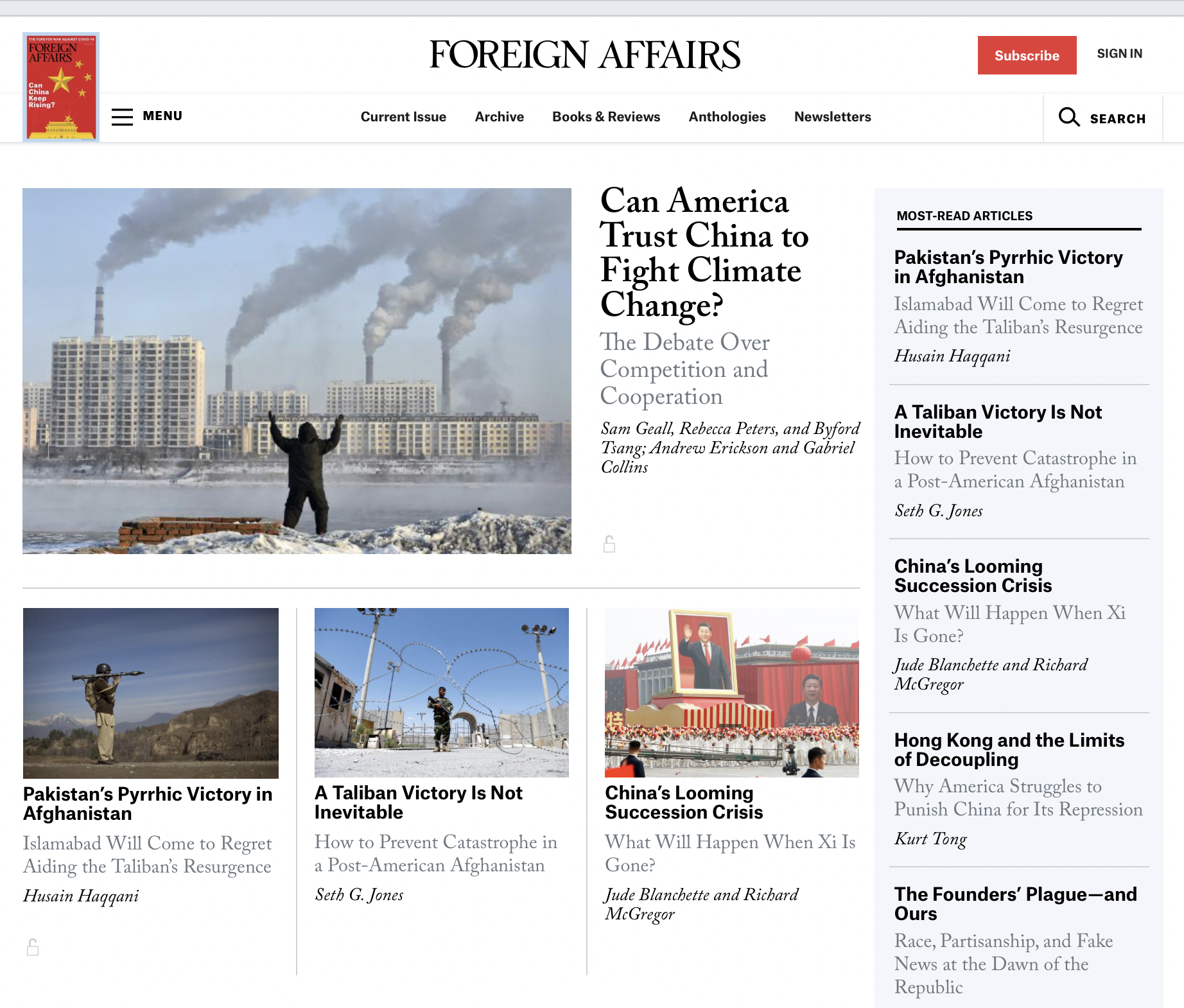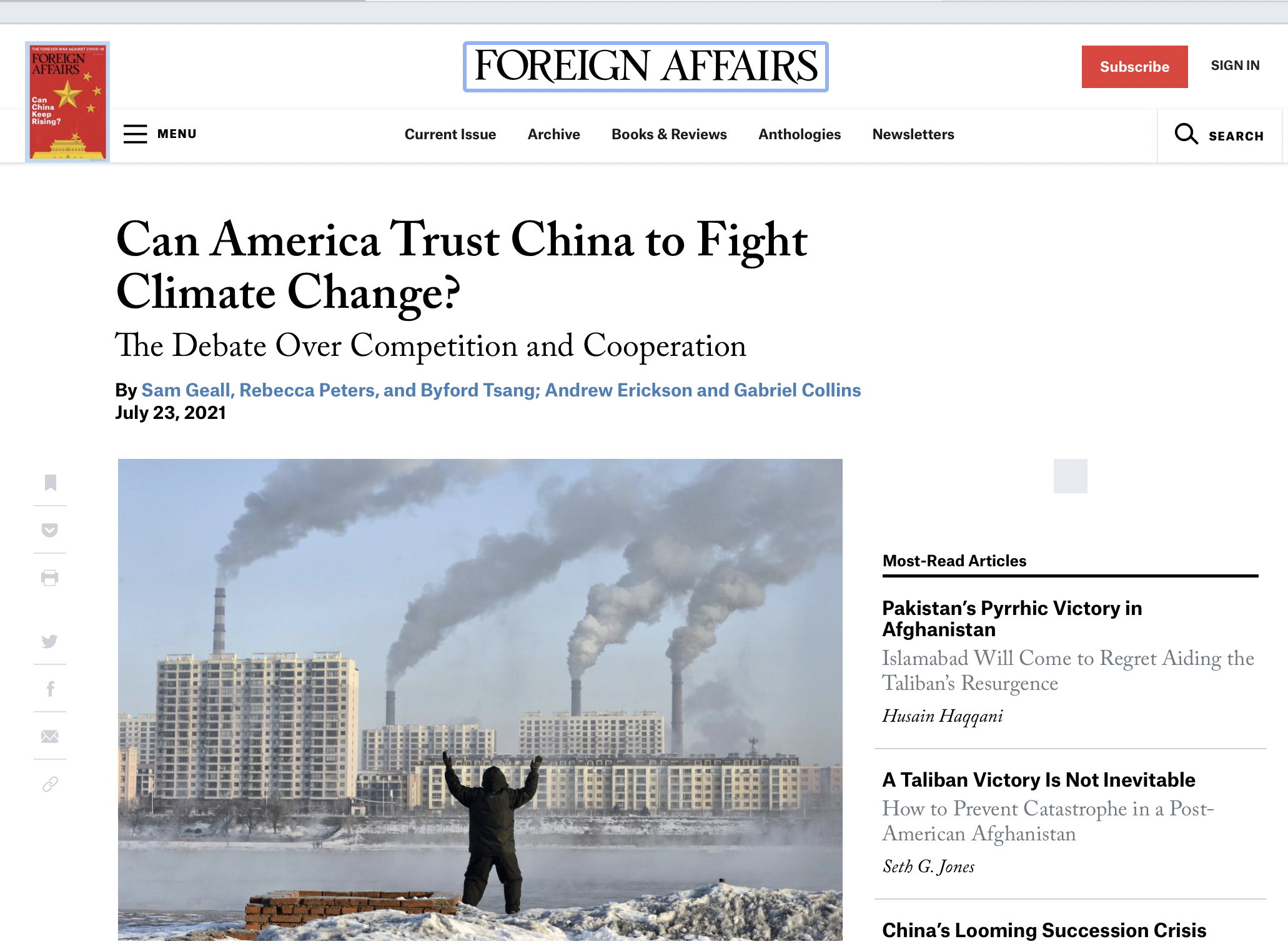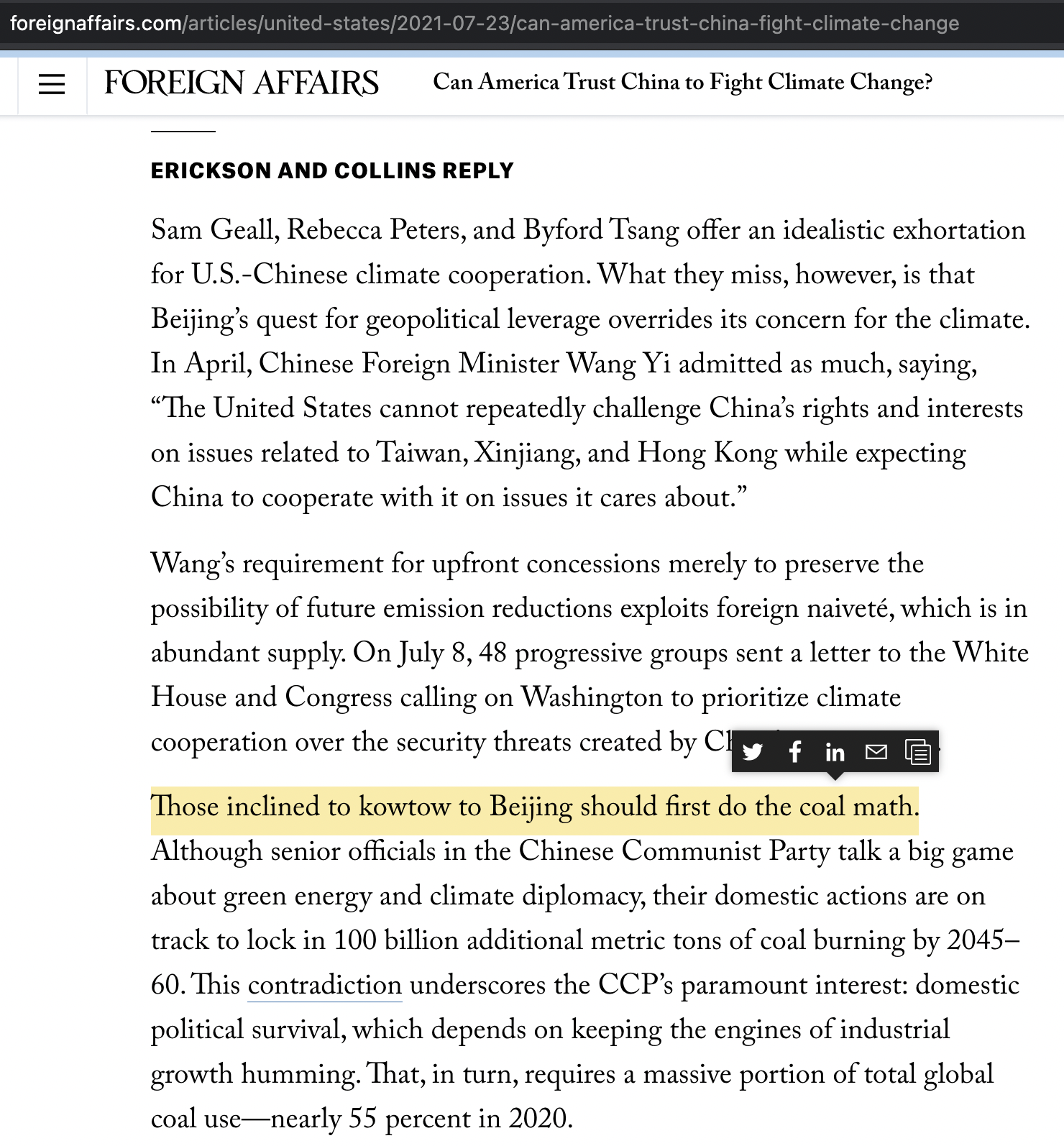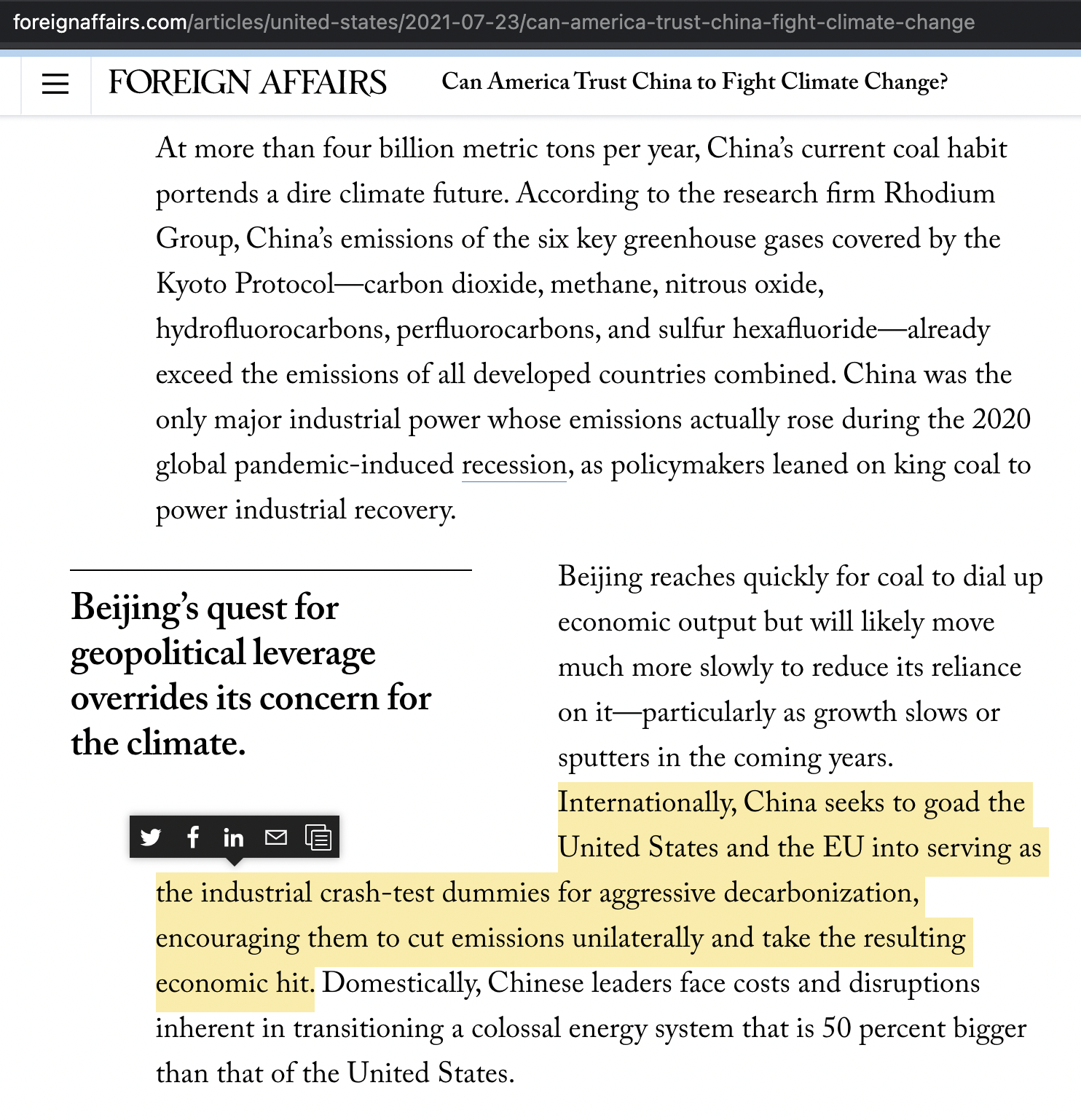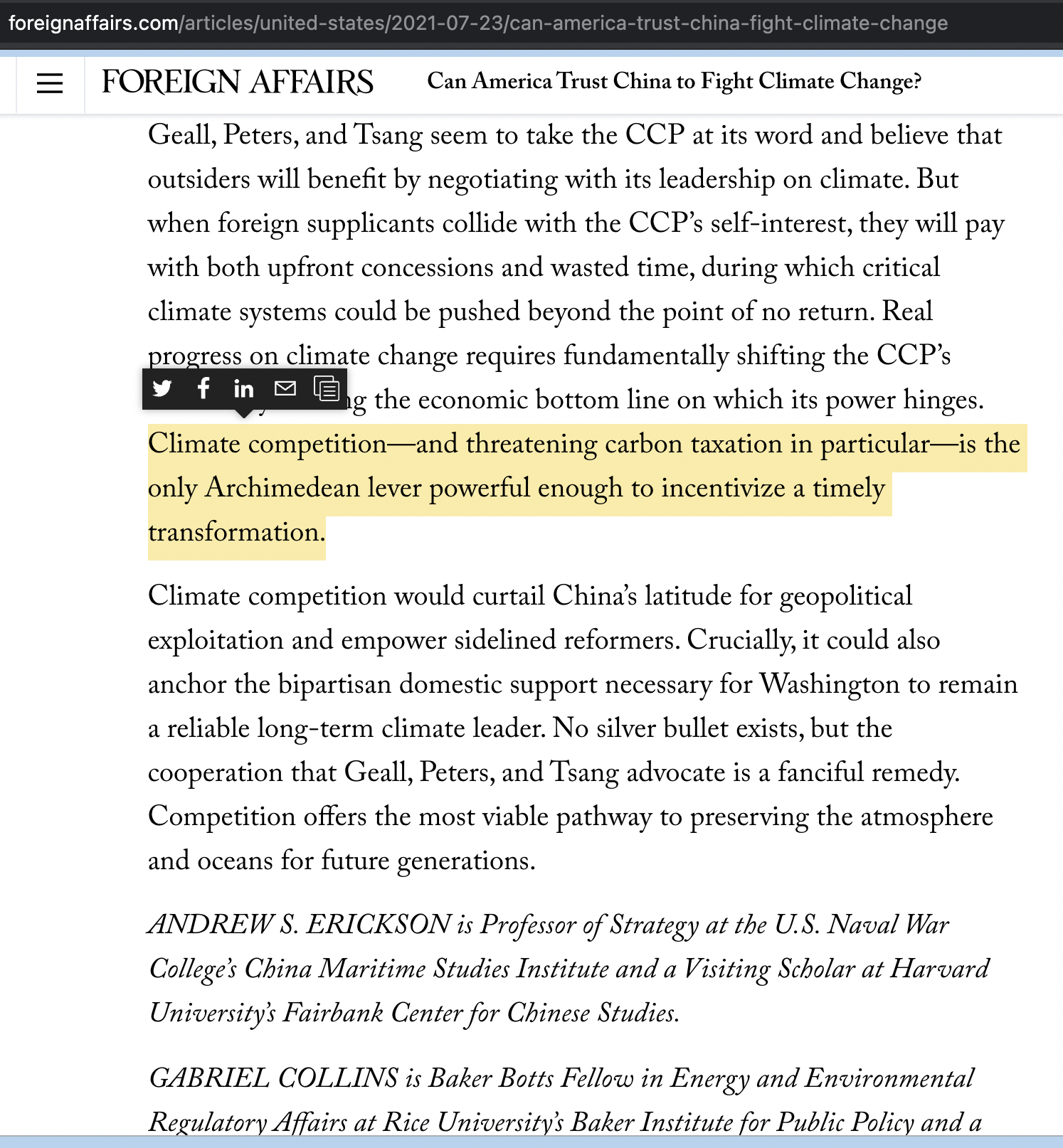Honored to Join at Foreign Affairs: “Can America Trust China to Fight Climate Change? The Debate Over Competition and Cooperation”
Grateful for the opportunity to participate in this debate on U.S.-China climate cooperation vs. competition with leading experts!
It’s based on my earlier Foreign Affairs article with longtime research colleague Gabe Collins at Rice University’s Baker Institute for Public Policy.
We explain why America currently can’t trust China to match its green rhetoric with coal-curtailing action—and offer the one Archimedean lever big enough to finally change Beijing’s carbon-spewing ways for the better of all.
Sam Geall, Rebecca Peters, and Byford Tsang; Andrew Erickson and Gabriel Collins, “Can America Trust China to Fight Climate Change? The Debate Over Competition and Cooperation,” Foreign Affairs, 23 July 2021.
- SAM GEALL is Acting CEO of China Dialogue and an Associate Fellow at Chatham House.
- REBECCA PETERS is Leland Foundation Association of Marshall Scholars Transatlantic Academy Fellow at Chatham House.
- BYFORD TSANG is Senior Policy Adviser at the think tank E3G.
- ANDREW S. ERICKSON is Professor of Strategy at the U.S. Naval War College’s China Maritime Studies Institute and a Visiting Scholar at Harvard University’s Fairbank Center for Chinese Studies.
- GABRIEL COLLINS is Baker Botts Fellow in Energy and Environmental Regulatory Affairs at Rice University’s Baker Institute for Public Policy and a Senior Visiting Research Fellow at the Oxford Institute for Energy Studies.
… …some policymakers and analysts in the United States argue that it is folly to cooperate with China on climate change. Washington, they contend, should not be suckered into believing that Beijing will sacrifice its economic and political ambitions on the altar of emission reduction. In Foreign Affairs, Andrew Erickson and Gabriel Collins (“Competition With China Can Save the Planet,” May/June 2021) describe China’s climate commitments as little more than hot air. “Serious decarbonization remains a distant prospect,” they write. “Xi’s bullish talk of combating climate change is a smokescreen for a more calculated agenda.”
That agenda… involves making “the United States and other countries supplicants” by extracting “concessions in other domains” for China’s participation in climate negotiations. Erickson and Collins argue that cooperation with China is a fool’s game and that instead the United States should embrace competition. Only a more aggressive stance will force China to mend its ways: a Washington-led global system of carbon border taxes will compel Beijing to seriously cut its emissions. … … …
ERICKSON AND COLLINS REPLY
Sam Geall, Rebecca Peters, and Byford Tsang offer an idealistic exhortation for U.S.-Chinese climate cooperation. What they miss, however, is that Beijing’s quest for geopolitical leverage overrides its concern for the climate. …
Those inclined to kowtow to Beijing should first do the coal math. Although senior officials in the Chinese Communist Party talk a big game about green energy and climate diplomacy, their domestic actions are on track to lock in 100 billion additional metric tons of coal burning by 2045–60. This contradiction underscores the CCP’s paramount interest: domestic political survival, which depends on keeping the engines of industrial growth humming. That, in turn, requires a massive portion of total global coal use—nearly 55 percent in 2020.
At more than four billion metric tons per year, China’s current coal habit portends a dire climate future. … China’s emissions of the six key greenhouse gases covered by the Kyoto Protocol—carbon dioxide, methane, nitrous oxide, hydrofluorocarbons, perfluorocarbons, and sulfur hexafluoride—already exceed the emissions of all developed countries combined. China was the only major industrial power whose emissions actually rose during the 2020 global pandemic-induced recession, as policymakers leaned on king coal to power industrial recovery.
Beijing reaches quickly for coal to dial up economic output but will likely move much more slowly to reduce its reliance on it—particularly as growth slows or sputters in the coming years. Internationally, China seeks to goad the United States and the EU into serving as the industrial crash-test dummies for aggressive decarbonization, encouraging them to cut emissions unilaterally and take the resulting economic hit. …
Geall, Peters, and Tsang seem to take the CCP at its word and believe that outsiders will benefit by negotiating with its leadership on climate. But when foreign supplicants collide with the CCP’s self-interest, they will pay with both upfront concessions and wasted time, during which critical climate systems could be pushed beyond the point of no return. Real progress on climate change requires fundamentally shifting the CCP’s calculus by altering the economic bottom line on which its power hinges. Climate competition—and threatening carbon taxation in particular—is the only Archimedean lever powerful enough to incentivize a timely transformation.
Climate competition would curtail China’s latitude for geopolitical exploitation and empower sidelined reformers. Crucially, it could also anchor the bipartisan domestic support necessary for Washington to remain a reliable long-term climate leader. No silver bullet exists, but the cooperation that Geall, Peters, and Tsang advocate is a fanciful remedy. Competition offers the most viable pathway to preserving the atmosphere and oceans for future generations.

